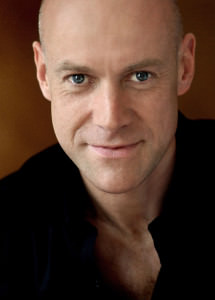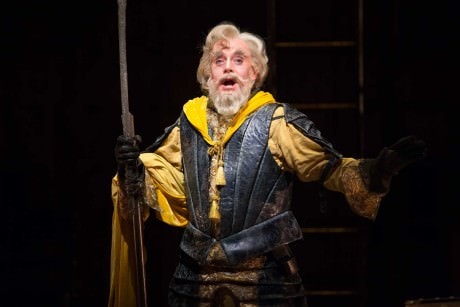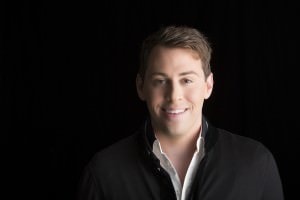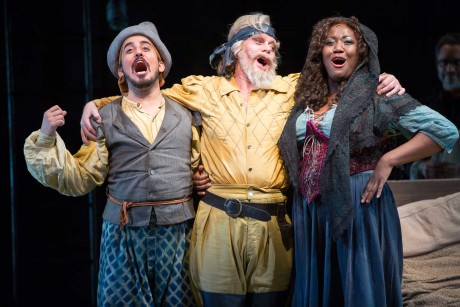Anthony Warlow is wowing DC area audiences as well as the local critics with his performance of Cervantes and Don Quixote in Shakespeare Theatre Company’s Man of La Mancha. It’s a great honor to interview one of my favorite performers, singers, and actors.

Joel: How are you enjoying your stay in DC so far and how would you describe the audiences in DC who have come to see you perform?
Anthony: They are wonderful audiences, they are very savvy audiences with a sense of knowing, which is wonderful for the artists on stage. It also raises the stakes for us because we need to come up to the plate for these people. I think if we play the truth, and we’ve been doing that in the way that the story is meant to be told, it’s accepted. It’s been wonderful that the subtleties that I have tried to put into this role, all those little moments that you think are almost throw-aways, are accepted and you can hear the immediacy of the reaction. Just extraordinary.
The city itself is extraordinarily beautiful. I’ve been spending time in New York, so to come here and know that the street is three times wider than a New York street, and there is clean air and it’s a clean city…I’ve had a wonderful time. And of course it’s about the museums for me, art and the gardens. I’m waiting for the blossoms to hit.
In 2002 you played this same role(s) in the Australian production of Man of La Mancha. How is this production similar and different than the Australian production?
Very different, very different. The essence is the same, but I think that the storytelling, the minimalist approach here has worked. It was what I wanted to do in Australia, but it was a company that didn’t trust the show. They were a new company that wasn’t theatre savvy. We did a good show and it was successful but it wasn’t the show I wanted to do. I said, “Let’s get a small theatre, let’s have very little on stage.” They said, “Oh, no, it has to be a big theatre, we have to have lots on stage.” We had a wonderful opera designer who designed an underground catacomb that was so real it wasn’t funny, which is fine, but the rest of the stuff was real as well. There was no sense of imagination.
The stakes of this production are really high and I think that the threat value of this is real, which I think it wasn’t in the one I did before.
How has your performance grown or evolved or remained the same performing in these two productions? And now that it’s 12 years later, how has that influenced the way you approached, prepared, and are performing the role?
The initial idea was the same. What we didn’t have when we did it in Australia was a couple of days of dramaturgy, which I think was vital. That kind of system isn’t the norm in Australia with musicals. The first time I had anything to do with that was on Zhivago. But it was so helpful, invaluable. That’s the kind of approach that I think, particularly on a piece that is so steeped in history, helps considerably.
One thing that I’m playing is something that I discussed with our director, Alan Paul, and which struck me when we were doing this dramaturgy session. Alan said, “I want to bring it up to today’s world.” I’ve found in the last few years that Alzheimer’s has been very much prevalent in a public way. I thought, rather than Don Quixote just being a fantastically whimsical crazy man, let’s give it a real sense of what could be the cause of all this, and go deeper into it.

I’ve gone into that realm with him, and it’s worked for me because there are stages where it actually starts to get worse and worse and then he comes out of it and he’s confusing himself. There is that wonderful scene where he comes out of it and says, “How should a man not know his own friends, Dr. Carrasco.” They get shocked, he’s shocked at himself because he thinks, “Where was I? I do know you….” I’ve witnessed people who get distressed and angry because they know that they know you but they don’t. That part of his character is the beginning of his demise, and has given me so much to work with.
Even though those moments can be very subtle, I’ve had people in the audience who have waited outside the stage door and told me they’ve picked up on it, they’ve recognized it. That’s the most satisfying thing, when you do something that’s really subtle and it works and translates. Then you’ve known you’ve done a good job.
How would you describe Director Alan Paul’s vision of this new production at STC, and how did this vision shape your performance?

I love the fact that Alan Paul, our director, has kept this claustrophobic prison and that we can’t leave the stage, which is, I think, one of the jewel concepts of the show. The second jewel is that we remain true to the original concept in that there is no intermission. It creates a snowball effect and gathers momentum as the show progresses. I was involved with a production years ago that had an intermission, which broke the chain. I love that he has kept this whole microcosm of the storytelling in this bubble. The look of it alone is wonderful. I’ve always said this is a chamber piece, and it really needs very little as far as props are concerned. It’s about what we create in the space. It’s been really wonderful to constantly challenge yourself each night and I think that’s been the joy of this piece.
The Secret Garden is another show in that form, where we had very little on stage and one would move a desk or a chair and it would be the library or the garden. It is a conceit that I absolutely fell in love with.
How do you relate to your characters Cervantes and Don Quixote?
I have what I call PPS or Peter Pan Syndrome. I have very childlike attitude toward life. And maybe having had dealt with having cancer made me realize that we only have one chance at this life. That it is short, so enjoy it. Be sensible about it, but enjoy it for what it is. The sense of play that I’m allowed to take part of in this industry is a blessing really. To make a living out of a hobby is one of the greatest joys in the world. I’ve learned to be a fool in the rehearsal room, and not to worry about being perfect. In fact, during rehearsals I was talking to Amber Iman (Aldonza) one day, she was feeling uncomfortable about certain things, and I said, “I found a quote today, and I think it will help us both.” It was, “We were born to be real, not to be perfect.” It’s very powerful stuff, simple but very powerful. And that’s all we can do. We’re all flawed to a point. But it’s in the flaws that other human beings find an interest.
That’s where this character is really interesting. None of us are perfect, but there is something about the strength of not giving up and living the dream. There is something in the essence of who Don Quixote is, following his dream but understanding that there are dark periods. You can’t understand true happiness unless you have had dark times. The purpose of life is don’t give up.
These characters are working towards a goal. That is true for all of us: whatever you happen to be working towards, whatever that goal is, the journey is universal. That’s a powerful image.
You are a cancer survivor, having battled lymphoma and won that battle. Can you share about that journey and its impact on you as a performer?
I had strength in the power of positive thinking and that there is a light at the end of the tunnel—and the odd prayer that it’s not going to be a train! As tough as it was, I knew that there was something that would come out of this that would be positive. But the fact of the matter was that because it was lymphatic cancer in my neck, those muscles had been compromised by the surgery and I didn’t have the strength to sing, something that was so connected to my soul. I was depressed for a period because I thought, “If I can’t sing, what else can I do? This is all I’ve ever wanted to do with my life.”
It was a dark time, obviously, but there were positive elements as well. When my strength and voice did come back and I started singing again, it was much higher than I had previously had. It’s almost like I had honey flowing through my system and when the tumor was removed it felt like crystal clear water. Everything was lighter and brighter and the voice maintained itself very, very well.
You are joined on the stage by a wonderfully talented cast. What do you admire most about their performances and what has surprised you most about working with them and watching them perform on the stage?
There is a sense of commitment that has been extraordinary from Day One. And the sense of respect that I have felt from and feel for all of them has been wonderful. It’s very rare when you find a family, a truly tight-knit group like this. There is a sense of continuity also, all being on stage the whole time. Everyone is already on stage from preshow but me and some guards, and while I like to say hi to everyone before the show, there are days when I don’t see any of them before, when I need to gather some energy. But then I come out and we are all in this together. It has been wonderful to work with all of them.

There has also been a great sense of play, and it’s thrilling to watch the choices they make. The choices they make are dead on, their understanding of “This is why I’m here,” of their characters. There are chances in life to continually be educated and every day is a learning day.
You have played The Phantom, Enjolras, Dr. Zhivago, Daddy Warbucks, and several Gilbert and Sullivan characters. Do these characters share any common traits or characteristics in the way you’ve performed them?
There are 88 notes on a piano and we all have certain tonal quality to our work.
I work in a very musical pattern and even in rehearsals I’ll wait until the orchestra is set and use the notes, incorporate them physically. I use my hands a lot as part of the character, moving to the accompaniment.
I love observing people, especially older people. I’m a character actor, and I incorporate these ticks, movements that I observe into my performances. I’ve had people say “that’s not really how they would move,” but I think you’ll notice them if you really observe the movements in everyday life. Sometimes you have to extend that or pull it back for the audiences. I love the subtleties, but sometimes you have to play that up.
I had a director once ask me if I had done any film work, and I said no, I hadn’t. He was surprised by that. Anthony Hopkins once said in an interview, when asked if he acted different between film and theatre, he said no, that if you are “performing from a place of truth, it will read.”
Martin Charnin, the original director of Annie, said, “If you blink an eye and you mean it, something your body will translate that and people will see it.” And I believe it.
Dr. Zhivago is about to open on Broadway. Why should NYC theatregoers see it and how would you describe the score that Lucy Simon has written?
The score is beautiful. Lucy Simon and I have become great friends and theatrical soul mates in a way. She also wrote The Secret Garden, and her writing is extraordinary.
I did two years of research before the show. The book is a fascinating journey into the thought patterns of Russia, into the people and the culture. It is a different way of thinking. The acceptance of Yuri’s and Lara’s “affair” is something that we may find disturbing. And his whole journey—he is not just healing Lara, he’s healing Russia. He is seen like a Christ figure, who comes in to sacrifice himself. He goes about it in the wrong way, but he does it for their good.
When did you first get the ‘opera and theatre buzz’? Where did you get your vocal training, and what is your first memory of performing on the stage?
I was 10 years old….It was an amateur production of Camelot with the Arcadians Theatre Company—I actually became a member there the following year! I fell in love with the music—Lerner and Loewe’s score is extraordinary. Then I auditioned for a production of Oliver, and was cast as one of the urchin boys.
The first professional production I saw was an opera, the Magic Flute, with the Australian Opera Company.
What are your ‘dream roles’ that you have not yet played that you would say “Yes” to right away if you were offered a chance to perform them?
That’s hard, I’ve done almost anything I’ve wanted to do! There are roles I’ve done in Australia that I’d love to do here in America. The Secret Garden is one. It’s one of my three favourites: My Fair Lady, which I’m about to go back and do in Australia, The Secret Garden, and Man of La Mancha, which I’ve had the chance to do twice now. The Secret Garden is beautiful, and Archie is a beautiful role. The show has touched a lot of young hearts and I think that’s a plus.
As time goes on there are roles I would have loved to play with but now my age has taken over—Billy Bigelow in Carousel for example. It’s a role that I love, and to take the saccharine side of it away, which is the way the movie versions have portrayed it because of its sensitive nature, would make it so much more powerful. It’s quite a dark story and has a darker side that can be explored nowadays with audiences who understand it. Kiss Me, Kate is another one that has darker undertones in the story, very complex and interesting, which I’ve not done.
Why is Man of La Mancha still so popular today and what does it have to say to the younger generation who are experiencing it for the first time here at Shakespeare Theatre Company?
Live your dream. And read. Read some classics. What you consider the arch that Cervantes went through writing Don Quixote, what became in essence the first real novel—it took such a huge journey being written. Yet he was a failure and died a failure. It’s powerful.
What advice do you have to offer young singer who is considering making musical theatre or the opera his or her career?
Always come from a point of classical method. Come from a point of lyric, truth, and let the character do the work. Something about musical theatre that is challenging is that in opera there is a structure and a flow. While there is structure and a flow in musicals, there is also room for play. It is important to be true to the work and do your research. It’s amazing how the rehearsal process can serve you if you know what’s going on!
LINKS
Anthony Warlow’s Official Website.
[A special thank you to Heather Jackson for her assistance with this interview.]




